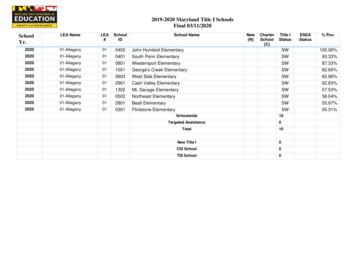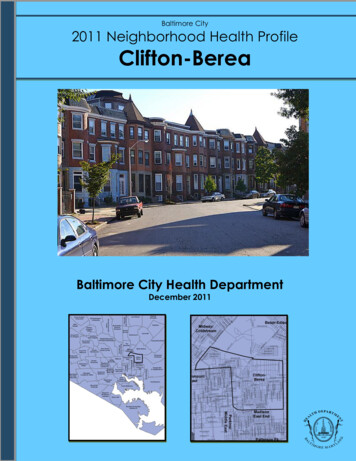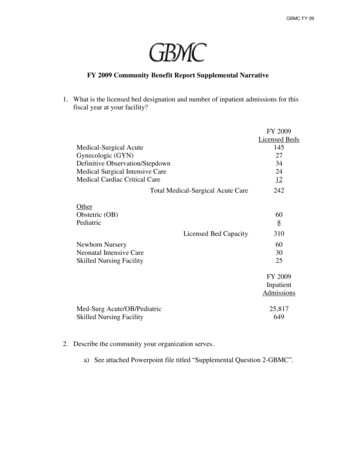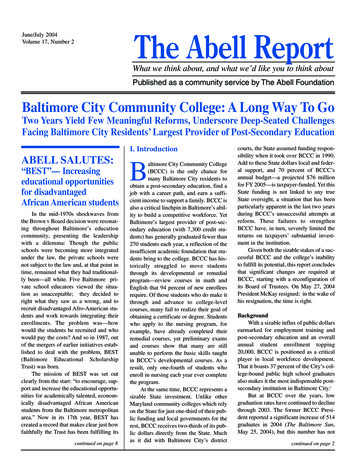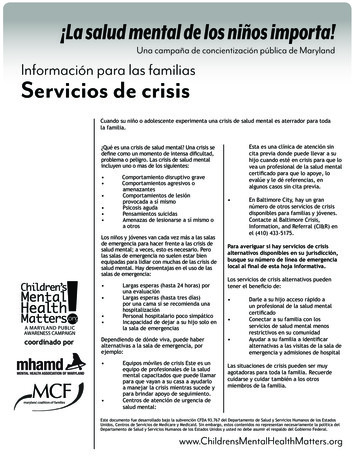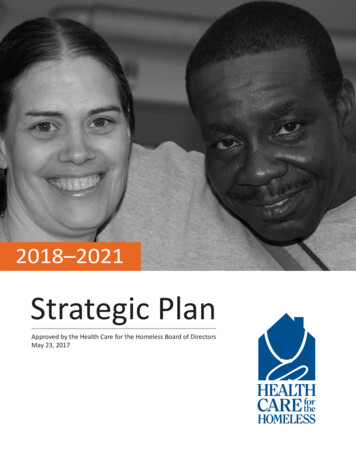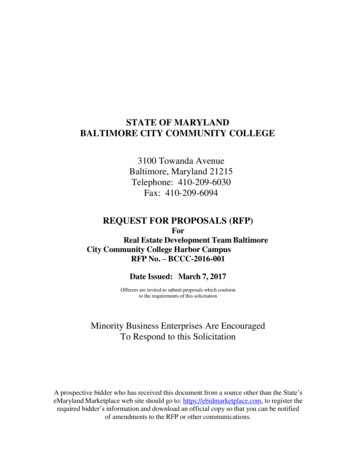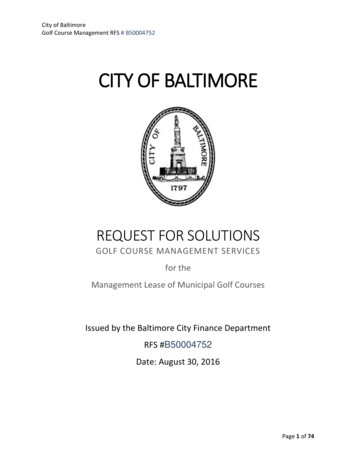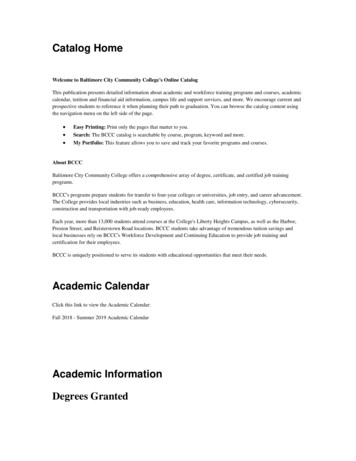
Transcription
Catalog HomeWelcome to Baltimore City Community College's Online CatalogThis publication presents detailed information about academic and workforce training programs and courses, academiccalendar, tutition and financial aid information, campus life and support services, and more. We encourage current andprospective students to reference it when planning their path to graduation. You can browse the catalog content usingthe navigation menu on the left side of the page. Easy Printing: Print only the pages that matter to you.Search: The BCCC catalog is searchable by course, program, keyword and more.My Portfolio: This feature allows you to save and track your favorite programs and courses.About BCCCBaltimore City Community College offers a comprehensive array of degree, certificate, and certified job trainingprograms.BCCC's programs prepare students for transfer to four-year colleges or universities, job entry, and career advancement.The College provides local industries such as business, education, health care, information technology, cybersecurity,construction and transportation with job-ready employees.Each year, more than 13,000 students attend courses at the College's Liberty Heights Campus, as well as the Harbor,Preston Street, and Reisterstown Road locations. BCCC students take advantage of tremendous tuition savings andlocal businesses rely on BCCC's Workforce Development and Continuing Education to provide job training andcertification for their employees.BCCC is uniquely positioned to serve its students with educational opportunities that meet their needs.Academic CalendarClick this link to view the Academic Calendar:Fall 2018 - Summer 2019 Academic CalendarAcademic InformationDegrees Granted
Associate of Arts (AA) - recognizes mastery in the liberal arts and in the fine arts and is intended for transfer toequivalent programs at four-year institutions.Associate of Science (AS) - recognizes mastery in science or technology with a heavy emphasis on undergraduatemathematics or science and is intended for transfer to programs at four-year institutions.Associate of Applied Science (AAS) - recognizes the mastery of vocational-technical occupation skills and is intendedfor those seeking immediate employment opportunities. Graduates with an AAS degree may transfer to a technicalprogram such as a Bachelor's Technology degree or to non-technical courses at a four-year institution.Associate of Science in Engineering (ASE) - recognizes mastery in programs in electrical engineering.Associate of Art in Teaching (A.A.T.) - recognizes a mastery in teacher education.Certificates GrantedCertificates requiring up to 45 credits may be earned. A certificate, while less than a degree, is an accomplishment initself; many certificate programs meet professional and government certification standards and/or requirements. Somecertificate requirements are established by outside professional or government agencies.Full-Time StudyFull-time students are those who register for a minimum of 12 credits per Fall or Spring semester. To complete therequirements for the Associate degree in two years, however, students will need to take 15 or sometimes as many as 18credits per semester, depending upon the program of study. Students who want to take more than 18 credits must have acumulative average of at least 3.0 and the permission of the Dean of Student Development. This policy applies to allacademic sessions including Summer.Declartion of Program ("Major")Students are encouraged to declare a "major" before completing 15 credits. Students who desire to change their majorare to consult with an Academic Advisor in the Student Success Center. Upon declaration of a major, students arereassigned to an advisor in their field of study.Graduation RequirementsDegrees and certificates are awarded in August, December and May of each academic year. Commencement is heldonce a year following the Spring semester.Associate degrees are awarded to students who meet all of the following requirements: A minimum 60 academic credits effective. Certain special programs may require more credits.Grade Point Average (GPA) of at least 2.0 (equivalent to a C average)Completion of the General Education Requirements (30-36 credits for AA and AS degrees; 21-22 credits forAAS degree) in addition to Instructional Program requirementsDemonstration of computer literacy by successful completion of approved computer literacy course orpassing the computer literacy test administered by the Test Center
Completion of PRE 100 by students who enter as first semester degree-seeking candidates. Students whotransfer 15 or more credits from another institution or are a returning student who attended BCCC prior to1994 and earned 15 or more credits are exempt from taking PRE 100 Meeting all requirements within 10 years of initial enrollment; re-entering students who have been away fortwo or more semesters (excluding summers) must meet any new program requirements.Simultaneous certificates and degrees are awarded in the same specialization. A second Associate degree can beawarded if the student completes a minimum of 15 credits beyond the requirements for the first degree, and completesall requirements in the second specialization.Certificates are awarded to students who meet all of the following requirements: 2.0 or better cumulative Grade Point Average (GPA)Completion of all College, program, and course requirementsCompletion of PRE 100 by students who enter as first semester certificate-seeking students. Students whotransfer 15 or more credits from another institution or are a returning student who attended BCCC prior to1994 and earned 15 or more credits are exempt from taking PRE 100 Demonstration of computer literacy by successful completion of approved computer literacy courses orpassing the computer literacy test administered by the Test Center.Students re-entering who have been away for two or more semesters (excluding summers) must meet any new programrequirements. Simultaneous certificates and degrees are awarded in the same specialization. A second Associate degreecan be awarded if the student completes a minimum of 15 credits beyond the requirements for the first degree, andcompletes all requirements in the second specialization. All BCCC students must meet the College's Computer Literacyrequirement in order to receive a degree or a certificate.All first-time full- and part-time degree and certificate seeking students are required to complete the PRE 100 coursewithin the first six credits.Computer Literacy RequirementAll BCCC students must meet the College's Computer Literacy requirement in order to receive a degree or a certificate.Students can meet this requirement in three ways:1.2.3.By enrolling in one of the majors listed below.By taking one of the computer courses listed below and passing the course with a "C" or better.By passing the College's Computer Literacy Test with a minimum grade of 70%.Majors that Satisfy the Computer LiteracyRequirement AccountingAdministrative AssistantBusiness AdministrationComputer-Aided Drafting and DesignComputer Information SystemsFashion DesignHealth Information Technology
Courses that Satisfy the Computer LiteracyRequirement BUAD 112: Computers for Business ManagementBCAP 104: Introduction to Operating Systems: DOS/WindowsBCAP 155: Word Processing for Business ApplicationsCADD 101: Introduction to CADDCISS 109: Principles of Computer Information SystemsCLT 100: Computer LiteracyCSC 108: Programming in CFASH 202: Computer-Aided Pattern DesignHIT 232: Computer Applications in HealthcareHIT 251: Healthcare Management and SupervisionOFAD 119: Word Processing Applications IFor hours of operation, please contact the Test Center at 410-462-7666.Pre-100 Orientation CourseThe purpose of PRE 100 (College Orientation) is to provide all first semester full and part-time degree and/orcertificate-seeking students with an introduction to student and academic services offered at Baltimore City CommunityCollege. This course was designed to ensure that we provide the students an opportunity to focus on strategies forpersonal and academic success. In addition, we ensure that all new students have the ability to utilize various supportand academic services offered at BCCC to achieve continuous success while paving a pathway for matriculation andCollege completion.Alternatives to Traditional ClassesSee also "Credits for Non-Traditional Learning" General Policies.Online Learning and the Center for Excellence inE-Learning and Teaching InnovationE-Learning OfficeLiberty CampusHarper Hall, Room 110online@bccc.edu410-462-7625Many BCCC courses offered on campus are also offered online. Thus, busy students have the convenience of learninganytime, anywhere, and can reach their educational goals while meeting job and family responsibilities. Studentsregister for online courses the same way they do traditional classes, provided they meet specific requirements for eachdelivery format, listed below. Online courses are suitable for mature, motivated and disciplined learners who appreciatethe convenience and flexibility of this educational format. More information is available online at www.bccc.edu. Clickon Programs and Courses and then Online Education.Online and Hybrid Courses
Online courses are taught via the Internet and comprise at least 80 percent of online semester contact hours. Studentscommunicate with their instructors and with one another asynchronously (not in real time) through Canvas, theLearning Management System (LMS) used at the College. Course documents, assignments and projects are exchangedthrough the LMS.Hybrid courses are taught partly online, partly in the classroom. Students enrolled in hybrid courses must attendspecific on-campus sessions and complete the rest of the coursework online. Students who wish to enroll in online orhybrid courses must have access to a computer that meets the requirements of the LMS.BCCC open lab computers, located in LSB 260-263, can be used for online courses. Call the Open Computer Labs at410-462-7411 for more information.Canvas System Requirements:Screen Size: 800x600 pixels or larger Operating Systems: Windows 7 and newer, Mac OSX 10.6 and newer, ComputerSpeed and Processor: 1 GB of RAM, 2GHz processor, a computer five years old or newer when possible InternetSpeed: minimum of 512kbps.Web Browsers: We recommend either Google Chrome or Mozilla Firefox for use with Canvas.Students must have adequate computer skills in order to be able to successfully complete these courses. For a self-testof computer skills, access the BCCC website at www.bccc.edu. Click on Current Students and then E-Learning.Orientation for Students Enrolled in Online andHybrid CoursesAll students taking online or hybrid courses for the first time are encouraged to attend a one to two-hour Orientation forOnline Students. During orientation, students learn about student and faculty expectations in online courses and arefamiliarized with the Learning Management System (LMS). The orientation is self-paced, and every student isautomatically enrolled. You can find the orientation listed in your Course List in Canvas after you've logged in.Log into Canvas at this URL: https://www.bccc.edu/mybccc.If you need additional help, email us at online@bccc.edu to set-up a one-on-one appointment. We'll be happy to assistyou!Verification of Students' Identity in the LearningManagement SystemBCCC's Learning Management System is fully integrated with student and College data. All credit courses offered atthe College, and all individuals who are provided with a College email address, are automatically created in Canvasthrough a snapshot integration of the two systems. Accordingly, students registered for online courses receive a uniquelogin based on their personal information that includes a combination of their name and a four-digit randomlygenerated number, unique to each student. The password used by students is a combination of numbers based on eachstudent's date of birth.
In many online courses, students are required to come on campus for testing where their photo IDs are checked, andthey complete their exams under proctored conditions. At orientation, students are instructed to keep their login privateand to comply with BCCC's Code of Conduct, which addresses issues of academic honesty.BCCC Grading SystemThe grading system is based on the "grade point" of each letter grade; the student's Grade Point Average (GPA) is thencalculated:LetterGP ValueA4ExcellentB3Above AverageC2AverageD1Below Average but PassingF0FailingThe following grades indicate non-completion of courses with a grade value of 0, but only F is counted in the GPA.APCredit earned through the Advanced Placement Examination (AP)AUAuditCLCredit earned through the College-Level Examination Program (CLEP).EXExemption grantedFXNever Attended. Faculty will use to report for students never attending class.IIncomplete. By written agreement with the instructor, the student may have an additional six weeks tofinish classwork or receive an F grade.SSatisfactory (non-credit courses only)UUnsatisfactory (non-credit courses only)WWithdrawal. Failure to withdraw officially may result in an F grade. See Add/Drop/Withdrawal Policy.W3Withdrawal Due to Extenuating Circumstances. Documentation of illness or job change must besubmitted to the Registrar's Office.XMExemption grantedStudents will not receive grades until all financial obligations are met.Change of Grade
No grade change will be permitted after the lapse of one calendar year calculated from the last day of the semester inwhich the course was given except under exceptional circumstances. Grades will not be changed without a detailedexplanation and documentation. The grade change will not be final until approved.Graduation HonorsGraduation honors are awarded to students who qualify for the associate degree as follows: High Honors - Overall GPA of 3.75 and aboveHonors - Overall GPA of 3.25 to 3.749Scholastic HonorsScholastic honors are awarded to students who qualify with a GPA of 3.0 and above with minimum 12 credits thatsemester, no grade lower than D, and all credits earned at BCCC. These honors are designated on the student's officialcollege transcript. Distinguished Scholar - Semester GPA 3.5 and aboveMeritorious Scholar - Semester GPA 3.0 to 3.499.Course Substitutions and ExemptionsStudents are required to fulfill all program requirements. In exceptional cases, such as when a student is in his/her finalterm and the course he/she requires has not been scheduled, the student may be permitted to substitute anotherappropriate course that produces similar competencies and involves similar areas of knowledge. A completed CourseSubstitution Form must be submitted to the Registrar's Office after it is approved by the Coordinator, Associate Dean,Dean and Vice President for Academic Affairs. The code SB appears on the student's record.A student may be granted an exemption from a required course or from a program requirement only when theDepartment offering the course or program has identified another course, credential, or other experience as meeting thestated requirement. Official documentation from the Associate Deans and the course or Program Coordinator isrequired. The code EX or XM appears on the student's record.Independent StudyStudents are expected to complete their programs through the normal schedule of courses. However, students in theirlast term are permitted to apply for required courses as Independent Study, provided that all the following conditionshave been met:1.2.3.The student is in his/her last term.The course is required by the student to complete a degree or certificate program.The course is not being offered on the term schedule, or the time of the course conflicts with another coursethe student needs to take.4. No appropriate course substitution can be found.5. The Independent Study is approved on the Independent Study Form by the respective Dean and VicePresident for Academic Affairs.Each application of Independent Study will be carefully reviewed and approved by the Academic Associate Dean,Dean, and the Vice President for Academic Affairs. Students are advised, however, that the College is under no
obligation to provide this option. When the Independent Study is approved, the student will meet with the facultyassigned on a weekly basis. A course taken as Independent Study will cover the same content as the regularlyscheduled course and have the same requirements and evaluation as outlined in the course syllabus.A student in his/her last semester may earn credit independent of a classroom setting for a specific course described inthis Catalog when the course is not offered in the semester schedule but is required in order to complete a degree orcertificate program.Note: The College is under no obligation to provide this option.Individual StudyTalented students may earn credit in certain disciplines through special projects, research, creative work, internships, orother means of independent academic pursuit without conforming to the restrictions of a traditional classroom setting.Individual Study credit may be earned only for a course that deals with content not included in an existing BCCCcourse. Individual Study is different from and should not be confused with Independent Study. For more information,see Individual Study.AuditingA student with the necessary prerequisites and the written approval of the Associate Dean may audit a course on aspace-available basis. Students who audit a course are not evaluated for a course grade and do not receive credit. Thetuition and fees for an audited course are the same as those charged for a credit course. Financial Aid does not coveraudited courses.Students must indicate at registration that they are auditing a course. Students may change their status from audit tocredit or from credit to audit only during the Add/Drop period. Since no credits are earned, audited courses are notcomputed in the student's grade point average. The grades report will show an audit in the grade column.Class AttendanceAll students are expected to attend all class sessions. Regular attendance on time at all classes is a minimum academicobligation and is considered by the College to be an integral and vital aspect of the learning process. Students whoattend class regularly are more likely to earn satisfactory grades. Lateness or failure to attend class may seriouslyjeopardize a student's performance and academic standing. The student is responsible for the content presented and/orassigned even if class is missed because of late registration, illness, or any other factor. Class attendance is required forfederal financial aid recipients.Children in Classrooms/LaboratoriesIt is the policy of Baltimore City Community to encourage safe, supervised campus visitations by children who aretaking part in organized scheduled activities, enrolled in specific classes or attending educational, cultural, and sportingevents on camps. Other than these activities, children are not permitted in the classroom, libraries, computer labs,science labs, physical education facilities or in any other areas of the College unless properly enrolled in a program.Under no circumstances may unsupervised children be allowed to play on campus grounds, roam campus buildings,and sit in campus buildings or outside benches on the grounds. Employees are prohibited from bringing children towork during working hours.
Repeating CoursesStudents are expected to make academic progress in all their courses. When students do not successfully complete acourse, they are permitted to repeat it one time. The College believes that both students and the institution must actresponsibly to ensure the effective use of their resources, time, and finances; therefore, students may not register totake a course for a third time (including class withdrawals) without visiting the Student Success Center. The gradereceived each time a student enrolls in a course is posted on the student's official transcript; however, only the highestgrade received in the course is computed in the student's Grade Point Average (GPA). For financial aid purposes, astudent may repeat a course once and receive financial aid only if the student has not received a grade of "C" or better.It shall be the policy of Baltimore City Community College to restrict students from continuously repeating courses forwhich they have received financial aid for payment of tuition and fees and for which they have received a grade of "C"or better. Therefore, students who receive a grade less than a "C" are permitted to repeat that course one time only.Withdrawals are not included in this policy.However, if the student chooses to repeat a class which was twice paid for by financial aid, he or she must assume thecost of tuition and fees for the third attempt. This policy is consistent with the intent of the federal SatisfactoryAcademic Progress regulations.Effect of Withdrawal on Academic StandingEach semester the College establishes and publishes a course withdrawal deadline date. If for any reason you need towithdraw from a course, complete and submit to the Registrar's Office the Withdrawal Form before the deadline date.By doing so, you will receive a W. Failure to take this action could result in a grade of F and a bill for the course(s).Grades of F, like grades of A, B, C, and D, are value weighted and are used to determine your Grade Point Average(GPA). W, on the other hand, does not affect GPA.It is your responsibility to withdraw officially from any class that you will not be able to complete successfully. Bytaking this action, you will be helping to safeguard your immediate GPA, your permanent grade history, and possiblyyour financial aid. See Add/Drop/Withdrawal Procedure.Academic StandingAcademic Good Standing at BCCC indicates that a student is progressing toward completion of a certificate or degreeprogram. The College adheres philosophically to the concept of open admission; however, program completion andgraduation require that students perform at a highly competitive level.A student is placed on Academic Warning if he/she attempts six credits or more in a semester and: fails to complete 50% of the credit load in that semester (receives grades of W, WX, F, U, I, or IP) orfails to maintain a Cumulative Grade Point Average (GPA) consistent with the College's minimum academicstandards, as follows:ASSOCIATE DEGREE PROGRAMSMinimum CreditsAttempted6-11CERTIFICATE PROGRAMSGPA.80Minimum CreditsAttempted3-6GPA.80
.80482.00242.00Academic Warning is indicated by Academic Warning printed on the Student Inquiry Report in the Academic Statusarea. The student on Academic Warning is not permitted to participate in Early Registration until the grades for thatcurrent semester are available. A student in Academic Warning status must review his/her program plans with aStudent Success Advisor, who will provide an assessment of future course load and corrective measures.The academic load carried by a student on Academic Warning may be limited. At the end of the probationary semester,the student's record is reevaluated. If the problem persists, the student is subject to Academic Dismissal.A student is academically dismissed from the College when he/she attempts six or more credits while on AcademicWarning and: fails for a second consecutive semester to complete 50% of the credit load in that semester (receives grades ofW, W3, F, or I) or, fails for a second consecutive semester to maintain a Cumulative Grade Point Average (GPA) consistent withthe minimum academic standards of the College.Dismissal is indicated by Academic Dismissal printed on the Student Inquiry Report in the Academic Status area. Thestudent is required by written notice from the College to attend a mandatory Student Success Workshop followed by areinstatement hearing with a Student Success Advisor to formulate an educational plan for completion of coursework.A student who is denied reinstatement may appeal to the Director of the Student Success Center. The student must sitout of the College for a period of one semester. A student who has been academically dismissed will be eligible toreturn to the College according to the following schedule:Academic Term Eligible to ReturnDismissal Imposed2017 Fall SemesterFall 2018 SemesterSpring 2018 SemesterSpring 2019 SemesterA student who is reinstated is limited to no less than six, and no more than nine billable hours (two courses) during theprobationary semester. If the student chooses to take less than six hours, the Academic Status will remain as Warningor Dismissal. The reinstated student is not permitted to register for subsequent semesters until the initial semester'sgrades are available. At that time, the student attends a follow-up hearing to ensure that he/she can handle an increasedload and is able to achieve Satisfactory Academic Progress.Academic RenewalAcademic Renewal offers a student the opportunity to continue College studies without the disadvantages of an earlierweak GPA. A maximum 15 credits of D and/or F grades earned at least 5 years before the semester in which AcademicRenewal is being requested may be excluded from the cumulative GPA. At least 12 credits with a minimum cumulative2.5 GPA must have been earned since the last semester for which Academic Renewal is being requested. AcademicRenewal is considered twice each year, in January and August.
Specific grades are removed from computation of GPA, but courses and the grades earned remain on the student'stranscript. Grades of C or better earned during the period for which exclusion of grades is being requested are includedin GPA computation. Academic renewal does not automatically satisfy academic progress standards for financial aidpurposes. Courses approved for Academic Renewal do not count toward graduation or degree completion. The decisionof the Academic Renewal Committee is final.Academic Renewal Request Forms are available in the Student Success Center and the Registration Office.Academic Grade Grievance ProcessA student who has sufficient evidence that his/her grades have not been determined in accordance with the terms setout in the instructor's syllabus/course outline/course policy, may seek resolution through the grievance process. In filingan academic grievance, a student must take the following steps:1.2.Attempt to resolve the matter with the instructor in a face-to-face meeting.If the student is dissatisfied with the decision rendered by the instructor, he or she will obtain a Student GradeGrievance Form (Form A) from the respective department administrative assistance, complete, and submit tothe Office of Academic Operations and Services. This form should spell out the exact nature of the complaintand the remedy sought. The Office of Academic Operations and Service will contact the faculty and allow thefaculty member an opportunity to respond to the grade grievance (Form A).3. Cases filed after faculty contracts end in May, are processed as soon as the instructor can be contacted whichusually occurs during the next full (fall/spring) semester. A grade grievance must be filed no later than 30days after the end of the semester in which the class was taken. The entire grade grievance process must becompleted typically within one year of the original filing. Students will be required to submit the followinginformation to complete their grade grievance file: Course Syllabus/Course outline/Course policy All work in questionA written explanation as to the nature of the grade grievanceForm AA log or account of Canvas gradesStudent InquiryThe Chair of the Grievance Committee (Dean of Academic Operations and Services or designee) will reviewboth the student's documentation and the explanation from the instructor. If there is sufficient evidence towarrant a grievance, the paperwork will be forwarded to the Department Associate Dean, typically withinfive (5) business days. The Department Associate Dean will attempt to mediate a resolution between theinstructor and the student. If a resolution is reached that warrants a grade change, the instructor will submit agrade change form to the Registrar's Office within five (5) business days after the decision to change thegrade has been made.5. If no resolution is reached from the meeting with the Department Associate Dean, the student may request thematter be taken to the appropriate Academic Program Dean, typically within five (5) business days. TheAcademic Dean will attempt to mediate a resolution between the instructor and the student. If a resolution isreached that warrants a grade change, the instructor will submit a grade change form to the Registrar's Officewithin five (5) business days after the decision to change the grade has been made.6. If no resolution is accomplished with the Academic Dean, the Student Grade Grievance Form (Form A) andall supporting documentation will be reviewed by the Dean of Academic Operations and Services (ordesignee) to determine if there is enough evidence to warrant a grade grievance hearing. At this point, theChair of the Grade Grievance Review Committee (GGRC) will assist the student with submitting a StudentGrade Grievance Form (Form B), requesting a review by the GGRC. The GGRC will be made up of Chair ofthe GGRC, two (2) faculty and two (2) students. The Senate Executive Committee President will select thetwo (2) faculty members. The President of the Student Governance Board Association (SGA) willrecommend the two (2) students.4.
7.8.9.If the GGRC accepts the grievance, the student will appear for a hearing before the Committee, which willconduct a grade grievance hearing (see Article 6.6.5). The Committee must make a recommendation to theVice
Welcome to Baltimore City Community College's Online Catalog. This publication presents detailed information about academic and workforce training programs and courses, academic calendar, tutition and financial aid information, campus life and support services, and more. . Liberty Campus Harper Hall, Room 110 online@bccc.edu 410-462-7625.
